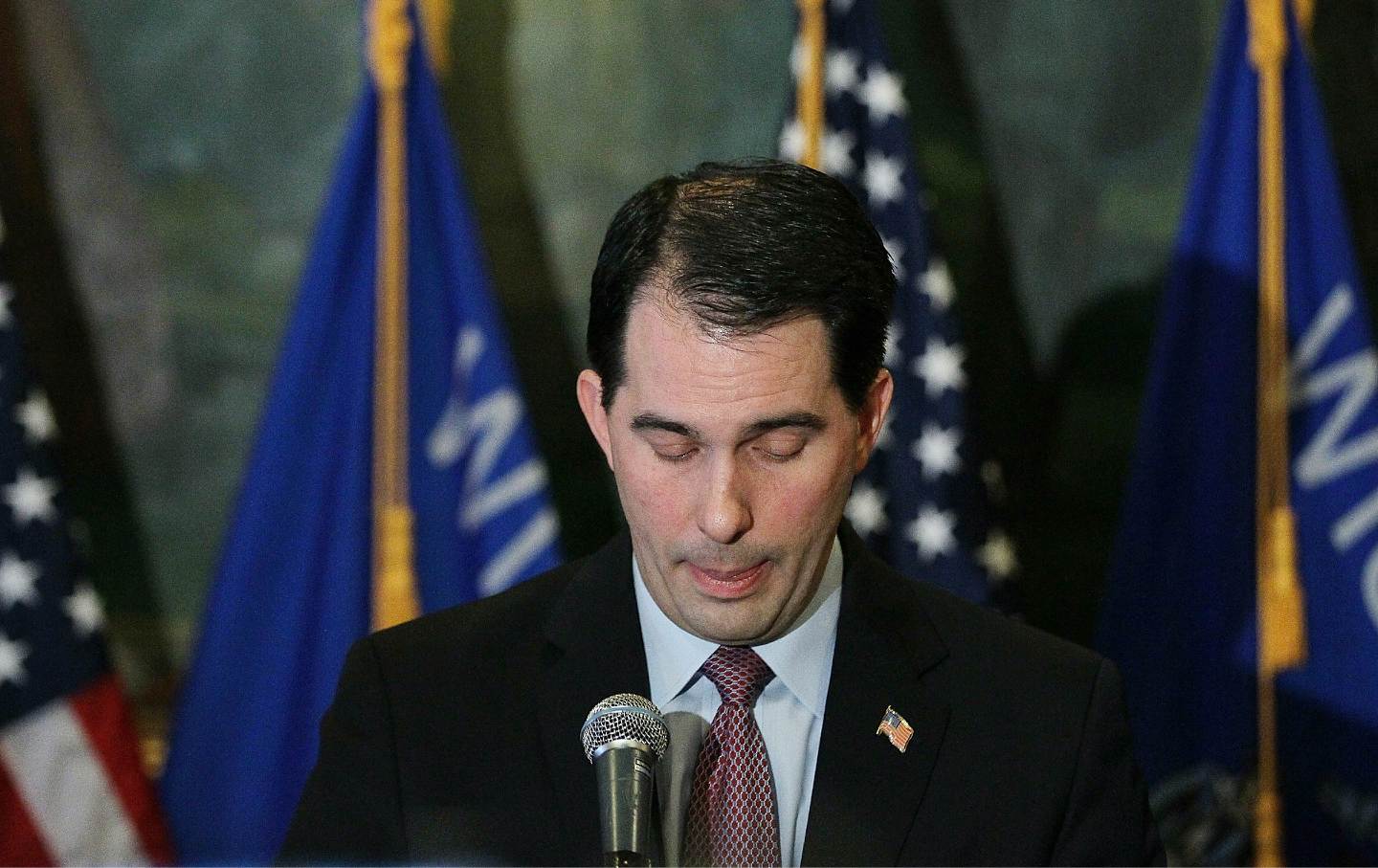Scott Walker’s Anti-Union Law Could Be Undone by a Court That Respects the Constitution
A right-wing state Supreme Court upheld the Wisconsin governor’s assault on workers. But the court now has a progressive majority and unions are challenging the law.

Wisconsin Governor Scott Walker during a press conference at the Wisconsin State Capitol on March 7, 2011, in Madison, Wis.
(Justin Sullivan / Getty Images)What was most notable about former Wisconsin Governor Scott Walker and his allies in the Republican-controlled state legislature during the 2011 fight to upend collective bargaining rights and other protections for public-sector unions was a determination to win at any cost. Walker’s sweeping Act 10 proposal, which came at the opening of his eight-year tenure as governor, was so unpopular that it sparked mass protests in Wisconsin and skepticism from several moderate Republican legislators.
So Walker and his allies pushed hard to get the bill over the line. So hard, it was charged at the time, that the process by which their “Budget Repair Bill” was enacted—as well as the version of the measure that was finally passed—did not pass constitutional muster. There were numerous legal challenges to the legislation and lower-court victories for those who asserted that it was unconstitutional.
That wasn’t a tough case to make. To pass the law, Republican legislative leaders jiggered rules to alter the number of votes needed to approve a measure that dramatically undermined the ability of some public-sector workers to organize unions and collectively bargain. Just as troubling was the fact that the legislation was written in a way that singled out some union members for protections—particularly members of police and firefighters union locals that just happened to have endorsed Walker—that were denied to others.
In 2012, Dane County Circuit Court Judge Juan Colas struck down Act 10 on the grounds that it violated both the Wisconsin and US Constitutions. Specifically, Judge Colas ruled that the differential treatment of specific unions and their members violated First Amendment guarantees of freedom of association and expression, not to mention the equal protection guarantees that are a bedrock of constitutional law.
But Walker had an ace up his sleeve. The state Supreme Court was then controlled by a conservative majority, which included members who were ideologically aligned with Walker’s anti-labor agenda and, in several cases, had histories of working with Walker in the political trenches. So, even if unions won cases in the lower courts, Walker could be confident that their efforts would be stymied in the one court that mattered above all others. And, finally, on July 31, 2014, the Wisconsin Supreme Court declared Act 10 constitutional in its entirety. The 5-2 vote left little room for future challenges, even though the argument that the law was unconstitutional remained compelling.
The case, it seemed, was closed—until the voters intervened.
Since 2014, the makeup of the high court has been radically altered by Wisconsin electors. In critical contests for 10-year terms on the Supreme Court, progressives won landslide election victories in 2015, 2018, 2020, and 2023, ending the dominance of the court by Walker’s anti-labor conservatives. With the April 2023 election win by Justice Janet Protasiewicz, the court now has a 4-3 majority that could well be inclined to reconsider the constitutionality of Act 10. And they will likely get a chance to do so.
Last week, a coalition of unions, including several affiliates of the Wisconsin Education Association Council, AFSCME, and the Teamsters, as well as SEIU Wisconsin and the Teaching Assistants Association (TAA/AFT)—which represents graduate student workers on the University of Wisconsin–Madison campus and is the oldest graduate students union in the world—filed a lawsuit demanding that Act 10 be struck down.
Noting the exemptions Walker included for police and fire units, the plaintiffs argued that “Wisconsin’s statute unconstitutionally discriminates against most public sector workers, denying their freedom to negotiate with employers on subjects beyond base wages and to be represented by a union without jumping through the hoops of burdensome annual recertification election.”
Maddie Topf, a copresident of the TAA, says the case comes down to a simple premise: “State-employed workers, such as graduate assistants like myself, should be guaranteed the same rights as public safety workers. We contribute so much to our communities, and we deserve a voice on the job.”
Walker is still championing his law, arguing, “This lawsuit would cause irreparable damage to our schools and to our counties and our local governments across the state and I hope people will realize that’s what’s at stake.”
But the unions that are bringing the suit say they are well aware of what’s at stake.
“Union members are filing the lawsuit now because of the dire situation that exists in our workplaces. Low pay, staffing shortages and worsening working conditions are hurting our ability to deliver public services to the communities that count on us every day,” the plaintiffs explained in a joint statement. “Just this week, the Milwaukee Journal Sentinel reported on toxic work culture where workers face regular harassment with little protection and the Wisconsin Policy Forum released a report on falling teacher pay, a leading factor of staffing shortages in schools.”
Popular
“swipe left below to view more authors”Swipe →That’s certainly a serious consideration for Betsy Ramsdale, a teacher and copresident of the Beaver Dam Education Association, who explained, “For over a decade, the deck has been stacked against educators like me. Teachers and support staff work in partnership with parents to teach students about compromise and collaboration, but school districts aren’t required to do the same. It’s frustrating and demoralizing, and a huge reason Wisconsin doesn’t have enough staff to meet student needs.”
The law is also, as Judge Colas noted a decade ago, in conflict with the state and federal Constitutions—a reality that the Wisconsin Supreme Court may finally be prepared to address.
Disobey authoritarians, support The Nation
Over the past year you’ve read Nation writers like Elie Mystal, Kaveh Akbar, John Nichols, Joan Walsh, Bryce Covert, Dave Zirin, Jeet Heer, Michael T. Klare, Katha Pollitt, Amy Littlefield, Gregg Gonsalves, and Sasha Abramsky take on the Trump family’s corruption, set the record straight about Robert F. Kennedy Jr.’s catastrophic Make America Healthy Again movement, survey the fallout and human cost of the DOGE wrecking ball, anticipate the Supreme Court’s dangerous antidemocratic rulings, and amplify successful tactics of resistance on the streets and in Congress.
We publish these stories because when members of our communities are being abducted, household debt is climbing, and AI data centers are causing water and electricity shortages, we have a duty as journalists to do all we can to inform the public.
In 2026, our aim is to do more than ever before—but we need your support to make that happen.
Through December 31, a generous donor will match all donations up to $75,000. That means that your contribution will be doubled, dollar for dollar. If we hit the full match, we’ll be starting 2026 with $150,000 to invest in the stories that impact real people’s lives—the kinds of stories that billionaire-owned, corporate-backed outlets aren’t covering.
With your support, our team will publish major stories that the president and his allies won’t want you to read. We’ll cover the emerging military-tech industrial complex and matters of war, peace, and surveillance, as well as the affordability crisis, hunger, housing, healthcare, the environment, attacks on reproductive rights, and much more. At the same time, we’ll imagine alternatives to Trumpian rule and uplift efforts to create a better world, here and now.
While your gift has twice the impact, I’m asking you to support The Nation with a donation today. You’ll empower the journalists, editors, and fact-checkers best equipped to hold this authoritarian administration to account.
I hope you won’t miss this moment—donate to The Nation today.
Onward,
Katrina vanden Heuvel
Editor and publisher, The Nation
More from The Nation

Zohran Mamdani on FDR, LaGuardia—and Trump Zohran Mamdani on FDR, LaGuardia—and Trump
In an exclusive interview with The Nation, the mayor-elect goes behind the scenes of his meeting with the president and talks about some of his political heroes.

The Shocking Confessions of Susie Wiles The Shocking Confessions of Susie Wiles
Trump’s chief of staff admits he’s lying about Venezuela—and a lot of other things.

The King of Deportations The King of Deportations
ICE’s illegal tactics and extreme force put immigrants in danger.

How Rob Reiner Tipped the Balance Against Donald Trump How Rob Reiner Tipped the Balance Against Donald Trump
Trump’s crude disdain for the slain filmmaker was undoubtedly rooted in the fact that Reiner so ably used his talents to help dethrone him in 2020.

The Economy Is Flatlining—and So Is Trump The Economy Is Flatlining—and So Is Trump
The president’s usual tricks are no match for a weakening jobs market and persistent inflation.

Trump’s Vile Rob Reiner Comments Show How Much He Has Debased His Office Trump’s Vile Rob Reiner Comments Show How Much He Has Debased His Office
Every day, Trump is saying and doing things that would get most elementary school children suspended.


